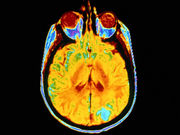Possible benefit for long-term hormone therapy, but results not definitive
THURSDAY, Feb. 16, 2017 (HealthDay News) — Women who use hormone therapy (HT) after menopause may not have a lower risk of developing Alzheimer’s disease (AD), although there is some evidence that long-term use — over a decade — might be tied to a lower risk, according to a study published online Feb. 15 in Neurology.
The new findings are based on 8,195 Finnish women who were between the ages of 47 and 56 when the study began in 1989. At that point, and then every few years, they reported on their hormone use. Then in 1995, that information became available in a national prescription registry. The researchers used it to verify the women’s reports.
Over 20 years of follow-up, 227 women were diagnosed with AD. In general, the researchers found no correlation between women’s hormone use and their risk of AD. However, women who said they’d used HT for more than 10 years were half as likely to develop AD as nonusers were. Yet, when the researchers looked at the data from the prescription registry — not women’s reports — there was no evidence that long-term HT was tied to a lower AD risk.
“Our results do not provide strong evidence for a protective association between postmenopausal HT use and AD or dementia,” the authors write.
Copyright © 2017 HealthDay. All rights reserved.








